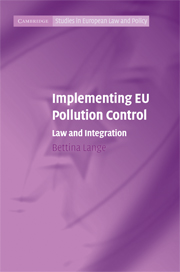Book contents
- Frontmatter
- Contents
- Series editors’ preface
- Acknowledgements
- Update on the IPPC Directive
- Abbreviations
- 1 Introduction
- 2 Traditional perspectives on the role of law in EU integration
- 3 Critical perspectives on the role of law in EU integration
- 4 What is EU ‘law in action’?
- 5 Talking interests – generating procedure: How political discourse constructs key aspects of BAT determinations in BREFs
- 6 Variation in open and closed BAT norms
- 7 What does it cost? Economic discourse in the determination of ‘the best available techniques’ under the IPPC directive
- 8 Does ‘law’ integrate? Licensing German and English coke ovens under the IPPC Directive
- 9 Conclusion
- Appendix: Methodology
- Bibliography
- Index
1 - Introduction
Published online by Cambridge University Press: 07 August 2009
- Frontmatter
- Contents
- Series editors’ preface
- Acknowledgements
- Update on the IPPC Directive
- Abbreviations
- 1 Introduction
- 2 Traditional perspectives on the role of law in EU integration
- 3 Critical perspectives on the role of law in EU integration
- 4 What is EU ‘law in action’?
- 5 Talking interests – generating procedure: How political discourse constructs key aspects of BAT determinations in BREFs
- 6 Variation in open and closed BAT norms
- 7 What does it cost? Economic discourse in the determination of ‘the best available techniques’ under the IPPC directive
- 8 Does ‘law’ integrate? Licensing German and English coke ovens under the IPPC Directive
- 9 Conclusion
- Appendix: Methodology
- Bibliography
- Index
Summary
What is law in European Union integration?
This book discusses relationships between law and integration. It focuses on legal integration in the European Union. By integration I mean:
the process whereby political actors in several distinct national settings are persuaded to shift their loyalties, expectations and political activities toward a new centre, whose institutions possess or demand jurisdiction over the pre-existing national states.
(Haas, 1958: 16)This definition recognises the interplay between various dimensions of integration. The shifting of loyalties, expectations and political activities towards a new EU centre also reveals a social aspect to EU integration. Political dynamics are analysed through reference to the building of new EU institutions (Wiener and Diez, 2004: 1). In discussing law and integration relationships this book focuses on the question: what is law in European Union (EU) integration? The book's emphasis is thus on analytical rather than normative issues. It departs from a current emphasis on normative concerns in EU integration studies, framed by lawyers as issues of control, accountability, transparency and legitimacy in the exercise of power in the EU (Armstrong and Shaw, 1998: 148; Wincott, 1995). While the empirical data discussed in this book shed light on these normative concerns, the book's main goal is to advance an understanding of the nature of law in EU integration processes. The book questions conceptualisations of law as formal, instrumental and relatively autonomous from its social contexts.
Information
- Type
- Chapter
- Information
- Implementing EU Pollution ControlLaw and Integration, pp. 1 - 27Publisher: Cambridge University PressPrint publication year: 2008
